In Hinduism, the Supreme Reality (Brahman) manifests itself in both male and female form. In Chinese duality, the feminine side is dark and passive, but in Hinduism the feminine is highly active. In fact, the word for "goddess" in Hinduism, shakti, means "power" or "energy."
Every major Hindu god has a goddess counterpart or consort and many Hindus worship the Great Goddess exclusively. Followers of the Great Goddess, known as Shakti or Devi, are called Shaktas.
Just as the masculine aspect of Brahman is manifested in several different gods, so does the feminine aspect of the divine take many forms. The major Hindu goddesses, described below, are all considered manifestations of Shakti.
Sarasvati: The Hindu Muse
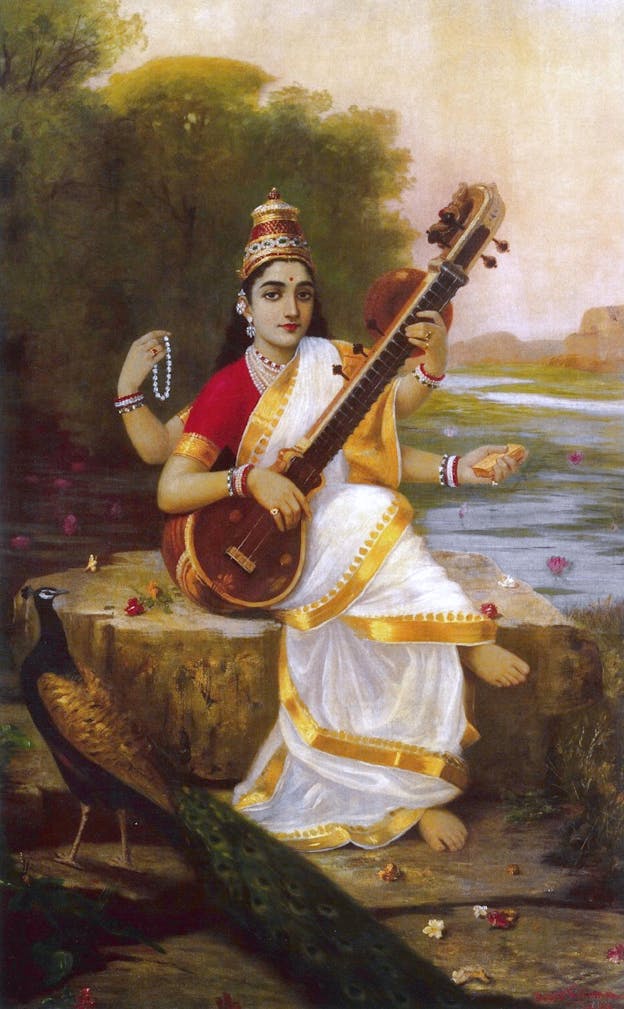
Sarasvati (also spelled Saraswati) is perhaps the most ancient goddess that is still widely worshipped today. She is the Hindu muse: the inspiration for all music, poetry, drama and science. Musicians pray to her before performing and students ask for her help before taking a test. She is the consort of Brahma, the creator god who is rarely worshipped anymore.
In statues and paintings, Sarasvati is fair-skinned and dressed in white to symbolize pure illumination. She rides a swan or a goose and has four hands: in one she holds a book; in another she holds prayer beads (because she is the source of spiritual knowledge, too); her other two hands hold a vina, a sitar-like musical instrument.
Not surprisingly, Sarasvati is especially revered by students and teachers. At the beginning of spring (January-February), her image is taken out in a jubilant procession. She is also a popular goddess in Jain and Buddhist mythology.
Lakshmi: Gentle Goddess of Wealth

Lakshmi is the goddess of wealth, so naturally she is quite popular. But she provides not only material wealth, but also good health and a joyful family life. She was born from the milky ocean seated on a lotus and holding a blossom in her hand.
In Hindu art, Lakshmi is full-breasted, broad-hipped and smiling kindly. She wears a red sari and coins rain down from two of her hands. In her other two hands she holds lotuses, representing the spiritual gifts she bestows. She is often shown seated on a lotus and being anointed by two elephants. Her vehicle is the white owl.

Lakshmi's husband is Vishnu, who metes out punishment, but Lakshmi is kind and always intercedes with Vishnu on behalf of her followers. In this role she might be compared to the Virgin Mary in Catholicism. Although Mary is a saint, not a goddess, she is believed to ask Christ the righteous judge to go easy on her devotees.
According to Hindu mythology, Vishnu has manifested himself in human form 10 times. In each of his incarnations, his wife Lakshmi has accompanied him: she was Padma to his Vamana, Sita to his Rama, Rukmini to his Krishna. The love stories of these divine couples are among the most beloved tales in Hinduism.
Lakshmi is worshipped by many modern Hindus, usually in the home every Friday and on festival days throughout the year. She is also highly revered in Jainism.
Parvati: Wife of Shiva, Mother of Ganesha
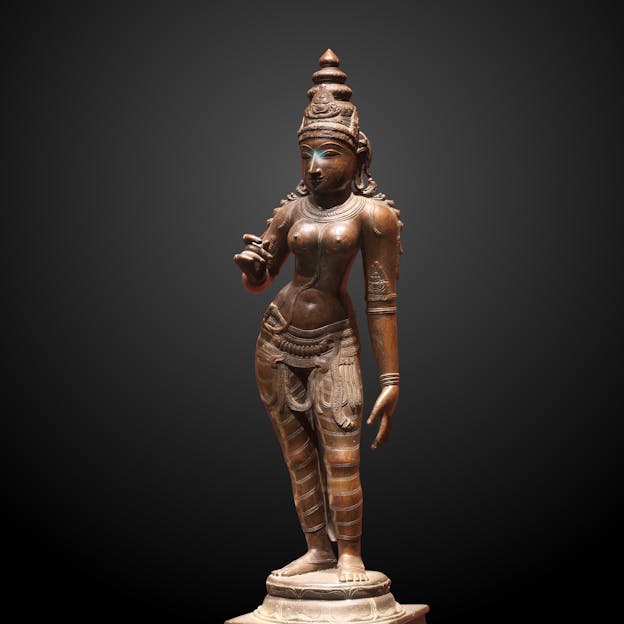
Parvati is the dark-skinned wife of Shiva and the mother of Ganesha and Skanda. She is depicted in art as a mature and beautiful woman, usually with Shiva. The Tantras are written as a discussion between Parvati and Shiva.
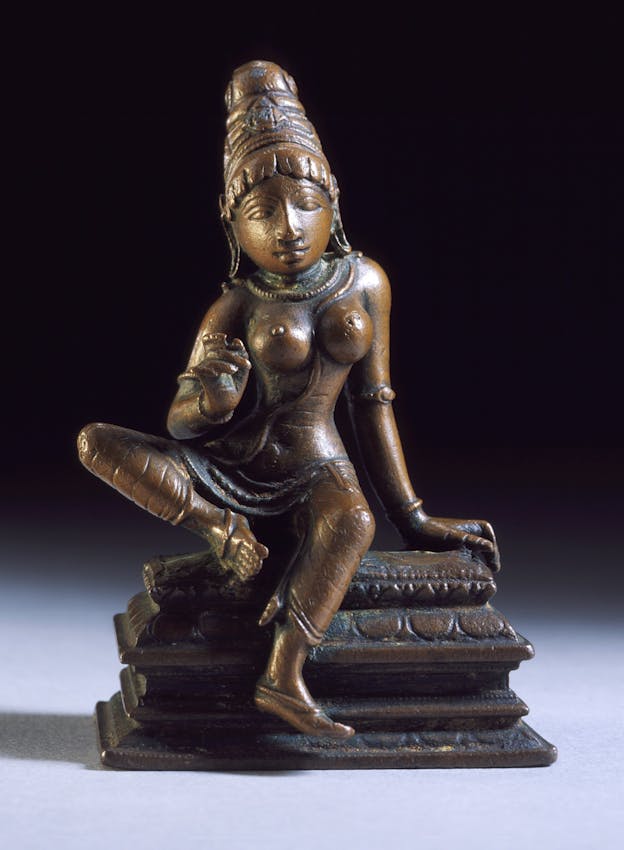
According to Hindu tradition, Shiva was once married to Sati. Tragically, Sati committed suicide by jumping into a fire, and Shiva could not be consoled. The distraught widower never wanted to marry again. However, years later, a young women named Parvati ("Daughter of the Mountain") committed herself to living an austere life of meditation to win over Shiva. She meditated in the Himalayas for years, not budging through driving rain, blistering heat, or elephant stampedes. But one day, she heard a child cry in suffering and she immediately sprang up to help. But it was Shiva, testing her resolve. She had failed the test, but he was so touched that she would give up what she desired most to help someone in need that he took Parvati as his wife. By some accounts, Parvati was Sati in a former life.
Durga: Warrior Goddess

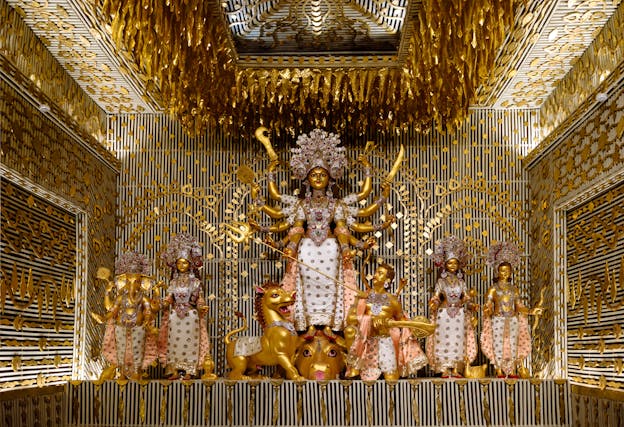
Durga is a fierce warrior goddess. She is depicted in Hindu art riding on a lion or a tiger, brandishing a variety of weapons and attacking the buffalo demon Mahisha. Her battles against evil are told in the popular Hindu text Devi Mahatmyam (Glory of the Goddess), and it is said that hearing the stories cleanses one from sin.
Kali: The Scary One

In Hindu myth, Kali sprang from the furrowed brow of the warrior goddess Durga when the latter could not defeat the demon Raktabija. Every time Durga struck the demon, drops of blood would fall to the ground and form another demon. Durga was getting frustrated, but Kali took care of it. She stuck out her tongue and caught all the drops of blood, then ate the demon right up.
Kali's name means "She Who is Black." She is generally depicted half-naked, with a garland of skulls, a belt of severed limbs and waving terrifying weapons with two of her ten hands. She is often dancing on a prostrate Shiva, who looks up at her admiringly. Two of Kali's hands are empty and in the mudras (gestures) of protection and fearlessness. Her tongue sticks out to swallow up evil and negative thoughts.
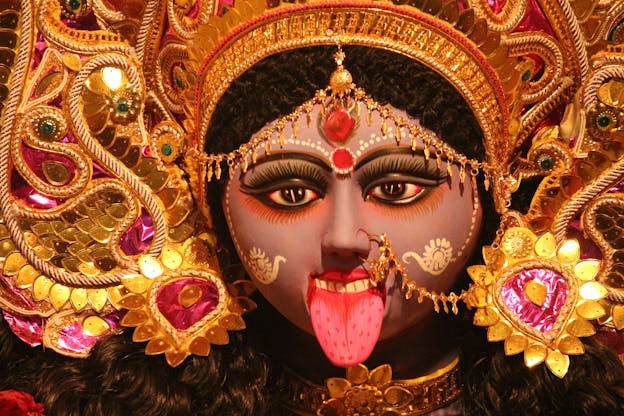
In mythology, iconography and devotion, Kali is associated with death, sexuality, violence and, sometimes, motherly love. She was probably adopted from the tribal mountain cultures of South Asia, though never quite tamed. She continues to be an intriguing, paradoxical figure. She has sometimes been the object of devotion of violent cults, but the most common modern Hindu perspective of her is largely symbolic.
Kali is revered for her no-nonsense way of eradicating negative thoughts and bad habits in the minds of her followers. In other words, she will lop off your inflated ego in no time flat if you ask her and she offers no guarantees that the process will be painless.
Dasha Maha Vidgas: Ten Great Goddesses
In addition to the above goddesses, who are worshipped publicly and communally, there are ten goddesses who are worshipped privately by yogis and mystics.
